The Boyish Side of TE Lawrence
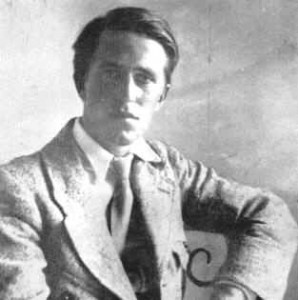 SERIES OF ARTICLES ABOUT DIFFERENT SIDES OF TE
SERIES OF ARTICLES ABOUT DIFFERENT SIDES OF TE
This will be the first part of a series of articles about different sides of TE. (*1) In my opinion, TE has become a fictitious personage, someone upon whom every friend, acquaintance or writer may all too easily project himself, his fantasies and interpretations. TE was partly to blame for this, as his brother Arnold remarked to Jim Ede, “I think you are not alone in finding it difficult to isolate the essential TE from the mind he merged in your own. I mean he tended to call things out of people rather than give them himself when he talked, and the result is that many think of him as rather like themselves, but more so.”(*2) He was an extraordinary adapter of behaviour, tending to take on the characteristics of the person he met, being able to see through the other’s eyes. He did not seem to have a clearcut, one-dimensional identity (this is who I am), but only a fragmented one, almost like a multiple personality (I am many). He did not seem to choose between these different sides, and by saying different things all the time and contradicting himself, he ultimately made himself into an enigma, and a fascinating source of endless speculation.
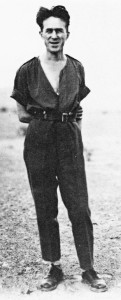 BOYISHNESS
BOYISHNESS
“When men remain boyish well into middle age, continuing to love pranks and practical jokes, to enjoy making animal noises with children and to seek attention by singing falsetto songs in public, it seems reasonable to interpret this immaturity as symptomatic – in part at least – of a reluctance to grow up.” (*3) This is a remark made by the biographer of a contemporary of TE, Lord Baden Powell (1857-1941). It seems to fit TE, who appears reluctant to grow up, become an adult, and take on an adult’s responsibility. It is best described by Ralph Isham (1890-1955) an American businessman who befriended TE after the war. “He resented his body’s permanent immaturity. He did not, I think, realize that his personality also would not quite grow up. His hatred for his body was a boy’s hatred; his fear of women was a boy’s fear; his terror of being noticed was a boy’s terror. He liked pranks and stories as a boy does. His perception and reactions (….) were essentially those of a sensitive child, immediate, intuitive, emotional; that is why he was comfortable only with people of simplicity, and that is why it was such a bitter shock to him to discover the world’s wickedness and selfishness when the tides drew him forth.” (*4)
This attitude of TE fits in the Victorian tradition of what the writer Cyril Connolly (1903-1974) calls “Perennial Boyishness”. It is the theory that childhood experiences were so intense for many men that it came to dominate their lives and to arrest their development. Its symbol was Peter Pan, the boy who would not grow up (“puer aeternus”), and it implies a longing for a perpetual childhood. Children were regarded as sexless, cherubic, innocent, and pure, and becoming an adult felt like, “A fall from grace which is not compensated for by any doctrine of future redemption; we enter the world, trailing clouds of glory, childhood and boyhood follow and we are damned. Certainly growing up seems a hurdle which most of us are unable to take.” (*5) Manifestations of “Perennial Boyishness” were an identification with and a sentimental love of boys (*6), as well as a prolonged adolescence, in which passionate emotional attachments to other men were the most significant of men’s lives. (*7) 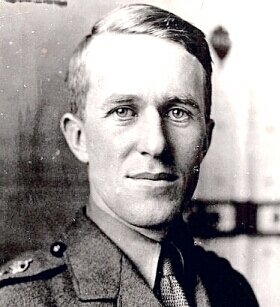
BOYISH LOOKS AND BEHAVIOUR
TE is often described as looking like a boy, even when he was over thirty. It ranges from “a strange boy” at 24, to a “very beautiful (eternal) youth” when he was 45. (*8) This impression seems not only to be caused by his smallness of stature, being only 1,65m long, but also by his behaviour. His impishness and sense of mischief is often mentioned. Even in Paris during the Peace Conference of 1919, he had his share of “schoolboy fun”, for example, when he showered toilet paper on Prime Minister Lloyd George (1863-1945) and Foreign Secretary James Balfour (1848-1930).(*9) “You are such a magician at leg-pulling, that one is unaware that one’s leg is off till you return that member with a non-committal air, as though you had just picked it up off the floor.” (*10)
PREFERRING PEOPLE OF SIMPLICITY
TE was very good with children, and wrote and spoke to them as if they were his own age. He wished kids didn’t have to grow up, since they “are so beautiful, unfinished.” (*11) He felt more comfortable with “people of simplicity”, usually less educated and younger than himself, like the Arabs at the archaeological diggings in Carchemish (1911-1914), his Arab bodyguard during the Arab Revolt (1916-1918), and his fellows in the RAF and the Tank Corps (1922-1935). At Carchemish he said, “Our people are very curious and very simple, and yet there is a fund of directness and child-humour about them that is very fine.” (*12) It was during this period that he met Dahum (1896-1918), an Arab boy with whom he developed an intimate friendship. His bodyguard during the Arab Revolt consisted mainly of outsiders and boys, two of whom, Daud & Farraj, he idealized in Seven Pillars of Wisdom. “Their sins were elvish gaiety, the thoughtlessness of unbalanced youth, the being happy when we were not (…) 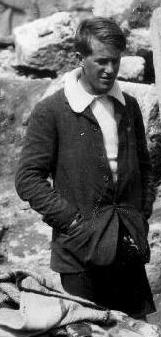 two sunlit beings, on whom the shadow of the world had not yet fallen – the most gallant, the most enviable, I knew.” (*13) His life in the Military Services was in a sense a boy’s life, since “he had gone back to his boyhood class and was at home.” (*14) Often he referred to his fellows as “the children” (or “the family”), while his house, Clouds Hill, became “an infant palace”. (*15) He enjoyed his role as a loving, older and wiser friend, being particularly sensitive to young men who were outsiders or in need, and he went to great lengths in his help and assistance to them. (*16)
two sunlit beings, on whom the shadow of the world had not yet fallen – the most gallant, the most enviable, I knew.” (*13) His life in the Military Services was in a sense a boy’s life, since “he had gone back to his boyhood class and was at home.” (*14) Often he referred to his fellows as “the children” (or “the family”), while his house, Clouds Hill, became “an infant palace”. (*15) He enjoyed his role as a loving, older and wiser friend, being particularly sensitive to young men who were outsiders or in need, and he went to great lengths in his help and assistance to them. (*16)
JUDGEMENTAL INTERPRETATION
At first glance, this interpretation of TE’s boyishness seems to be very simple and straightforward. The problem with it, however, is the mistaken impression which it gives: that of a carefree child living a child’s life, who shirks adult responsibilities. And this is, in my opinion, certainly not the case with TE. He took responsibility for who he was and tried to manage his different sides as best as he could. He showed responsibility and commitment in his work (historian, archaeologist, map maker, leader of the Arab Revolt, politician, soldier, mechanic, writer) and in all the things he did (being a friend, music-lover, motor-rider, reader). Many consider it strange and childish that TE behaved in the fashion he did, putting “high value on the child-quality in grown-ups” and sometimes even enjoying “arrested development in his adult friends.” (*17) But in my opinion it may be a good thing for a person’s mental health when he is able to give different sides of himself, including a boyish one, a place in his life, and to create a good balance between them.
PLAYFULNESS
What happens if we look at TE’s behaviour from a different perspective, this time with an open mind, without judgement, and accept his behaviour for what it may have been for him? His boyishness may then be regarded as playfulness. Playfulness is looking at the world, in wonderment and amazement, as if everything were new. It means being imaginative, spontaneous, honest and free, and being able to investigate, explore and discover by trial and error, without fear of failure. In play there is no failure, it can’t be wrong, since there are no rules. It can be what you want it to be, and therefore there are no judgements in it, and there is no strange or weird, childish or irresponsible. Playfulness is the opposite of the things you should be doing, of doing the right thing in the right way, and therefore it is the opposite of the critical mind. The famous artist Pablo Picasso (1881-1973) spoke of the importance of keeping this playful and creative part of ourselves alive, “It took me four years to paint like Raphael, and a lifetime to paint like a child. (…) Every child is an artist. The problem is how to remain an artist once he grows up.”
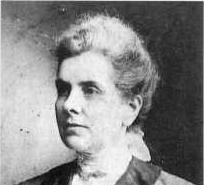 IDEAL STANDARD
IDEAL STANDARD
Playfulness was something TE had missed as a child, because he was never really allowed to be one. (*18) According to his younger brother Arnold, “A childhood like his would create an unbalance in anyone’s mind. It brought about a very severe knack, even worse than the war.” (*19) This is a poignant statement, particularly the last part, because during the war TE experienced horrific warfare, and was tortured and raped by the Turks. He was forced to be an adult too early in his life by the perfectionism of his mother, who wanted him to be an immaculate child, and expected him to do something special with his life. She enforced this ideal standard with strict discipline and punishment. Mother’s perfectionism was eventually replaced by a strong inner perfectionist (*20) and inner critic (*21), which led TE to be very depreciative of his own achievements, and eventually to depression. TE suffered from too much responsibility during his childhood and during the Arab Revolt and its political aftermath, and therefore creating a special place for a playful part of himself in his life may be considered a rejection of the responsibility to be perfect.
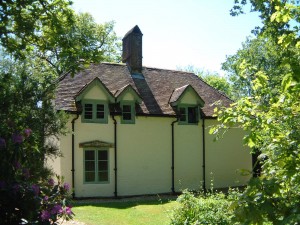 A SAFE PLACE
A SAFE PLACE
It was TE’s cottage, Clouds Hill, which became a refuge from the standards of his mother and her English world of respectability and responsibility. It was a place where there were no obligations, no expectations, no rules. You were invited to live according to your own nature, to be yourself and to do the things you had always wanted to do, without bothering about what others would think. Over the door hung the sign Ou Phrontis, which symbolized that “We weren’t to care, as soon as we were inside; we were to feel easy, and not worry about the world and its standards.” The phrase came from a story by the Greek historian Herodotus (484-425 BC): “A young man was going to marry a king’s daughter, but unfortunately during the dinner party he got drunk, stood on his head on the table and began dancing with his legs in the air. 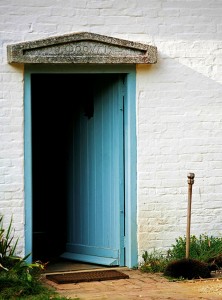 The king was shocked at such conduct in a prospective son-in-law, and said to him severely: “You have danced away your bride.” But the young man didn’t care. He replied, “Ou Phrontis, “I don’t care”! And continued to wave his legs in the air.”(*22)
The king was shocked at such conduct in a prospective son-in-law, and said to him severely: “You have danced away your bride.” But the young man didn’t care. He replied, “Ou Phrontis, “I don’t care”! And continued to wave his legs in the air.”(*22)
TE’s cottage became the place where his male friends (*23) were welcome to spend time with him, not by appointment, but when the route and spirit would move them. His possessions, like his books and records, were theirs, and he liked it when visitors left little evidences of their presence. The men who came, listened to music, talked, read books, drank water or tea, and ate out of tins, when and wherever they felt like it. TE was able to integrate different parts of his life, mixing social classes and bringing together artists, writers, tank corpsmen, and airmen to enjoy each other’s common humanity. (*24) Clouds Hill became a safe place for TE, where he finally found some rest from his tumultuous life.
“It’s streaming with rain against the western window, and the trees are tossing: – not as if they were playing, but wearily, as though this fourth day of the wintry weather was too much against their longing to turn green: and inside it is calm as ever. We went out in the drift and looked under the rhododendron for dry stakes: and have got enough to make a red fire, 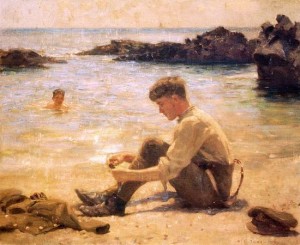 in whose heat the damp fir-logs burn away freely: and Palmer is sitting in front of it with his hands folded waiting for the Rosenkavalier waltz to end. After it he wants a little bit of Mozart as played by the Lener. Palmer gets drunk on music: – likes the sort which makes him most drunk. Russell is reading the Dream: and shocking Palmer out of his peace by elbow digs now and then, when he comes on an extra-juicy paragraph. Meanwhile I’m out over by the very wet window (but on its dry side) writing to you. There’ll be tea when I’ve finished the letter and more and more animal contentment after that: till we wind up, when the dark comes, with a movement out of a Bach thing for two violins. We always finish with that, if the time is dark enough.” (*25)
in whose heat the damp fir-logs burn away freely: and Palmer is sitting in front of it with his hands folded waiting for the Rosenkavalier waltz to end. After it he wants a little bit of Mozart as played by the Lener. Palmer gets drunk on music: – likes the sort which makes him most drunk. Russell is reading the Dream: and shocking Palmer out of his peace by elbow digs now and then, when he comes on an extra-juicy paragraph. Meanwhile I’m out over by the very wet window (but on its dry side) writing to you. There’ll be tea when I’ve finished the letter and more and more animal contentment after that: till we wind up, when the dark comes, with a movement out of a Bach thing for two violins. We always finish with that, if the time is dark enough.” (*25)
NOTES
*1 Other sides which will be dealt with are: the inner critic, the perfectionist, the pusher, the adapter, the puritan and the beast.
*2 Letter Arnold Lawrence to Jim Ede 9-9-35, Kettle’s Yard (Cambridge).
*3 Tim Jeal – Baden-Powell (Hutchinson, London 1989),p.87
*4 A.W. Lawrence – T.E. Lawrence By His Friends (Jonathan Cape, London 1937),p.296/7. Leonard Woolley (1880-1960), who was with TE in Carchemish, speaks of “his essential immaturity” (T.E.Lawrence By His Friends,p.91) and George Bernard Shaw (1856-1950), the famous writer says “… at forty he still had the grinning laugh and artless speech of a schoolboy; and powerful and capable as his mind was, I am not sure that it ever reached full maturity.” (T.E. Lawrence By His Friends,p.247) According to TE’s second cousin Lord Vansittart (1881-1957), he was “an ageless schoolboy, who did not grow up but grew older.” (The Mist Procession: The Autobiography Of Lord Vansittart – Hutchinson, London 1958,p.261)
*5 Cyril Connolly – Enemies Of Promise (Deutsch, London 1973),p.254
*6 This sentimental (Uranian) love of boys was usually chaste, since sexuality would desecrate the innocence and purity of the beloved.
*7 Examples of these attachments are: Alfred Tennyson (1809-1892) & Arthur Hallam (1811-1833), Robert Louis Stevenson (1850-1894) & William Ernest Henley (1849-1903), Rudyard Kipling (1863-1936) & Wolcott Balestier (1861-1891). And more fictitious: Sherlock Holmes & Dr Watson and Robinson Crusoe & Friday.
*8 James Elroy Flecker calls him “a strange boy” after their first meeting. (Letter to Frank Savery 10-1-1912, in: James E. Flecker “The Letters Of J.E. Flecker To Frank Savery” – Beaumont Press, London 1926 – quoted by Phil O’Brien, TEL Whittier List 24-3-1999). Colonel Richard Meinertzhagen speaks of “a pleasure boy” when he first laid eyes on him in 1917. (Colonel R. Meinertzhagen – Middle East Diary 1917-1956 – Cresset Press, London 1959,p.28) Colonel Eduard Bremond calls him “a Catholic choir boy”, when he saw TE in 1918 wearing white Arab robes in Boulogne (John E. Mack – A Prince Of Our Disorder: The Life Of T.E. Lawrence – Weidenfeld & Nicholson, London 1977,p.259) Eric Kennington says he was “a small, grinning hatless kid”. (T.E. Lawrence By His Friends,p.262) E.M. Forster, when he first meets TE in 1921, remembers him as “a small fair-haired boy”.(T.E. Lawrence By His Friends,282). And Flight-Lieutenant Sims describes TE in his thirties as “a very small boy, angelically fair, from whom another boy has just pinched an apple” (T.E. Lawrence By His Friends,p.550), and when TE was about 45 as a “very beautiful (eternal) youth”. (T.E. Lawrence By His Friends,p.552). John Buchan is the only one who describes TE as looking “like a pretty girl”, and mentions “his girlish face”. (Buchan, speech 1939 – quoted in: Andrew Lownie – The Friendship Of Lawrence And Buchan, in: Journal Of The T.E.Lawrence Society 1 (1995),p.57 & 64).
*9 Lawrence James – The Golden Warrior: The Life And Legend Of Lawrence Of Arabia (Weidenfeld & Nicholson, London 1990),p.311
*10 Letter from H.M. Tomlinson 5-12-1928, in: A.W. Lawrence (ed.) – Letters To T.E. Lawrence (Jonathan Cape, London 1962),p.189
*11 Letter to Lord Lloyd 22-1-1929, in: Malcolm Brown (ed.) – The Letters Of T.E. Lawrence (J.M. Dent & Sons, London 1988),p.399
*12 Letter to his parents and brothers 18-6-1911, in: John E. Mack – A Prince Of Our Disorder,p.91
*13 T.E. Lawrence – Seven Pillars Of Wisdom (Jonathan Cape, London 1935),p.311. In reality their names were Ali and Othman (J.M. Wilson – Lawrence of Arabia: The Authorised Biography Of T.E. Lawrence – Heinemann, London 1989,p.492/3)
*14 “To friends who wondered aloud how he could endure the company of the barrack-room and its bareness TE might retort, almost fiercely, that he had gone back to his boyhood class and was at home.” (Comments and corrections by TE on Liddell Hart’s typescript for his biography on TE, June/July 1933, in: T.E. Lawrence To His Biographer Liddell Hart – Doubleday, New York 1963,p.79)
*15 “What can I do for you, child?” (Paul Tunbridge – With Lawrence In The Royal Air Force – Buckland Publications, Kemsing 2000,p.39). “One of the children might come, too.” “The family is sitting still and reading, in expectation of a large tea shortly.” (Letter to Charlotte Shaw 6-4-1924, in: Jeremy & Nicole Wilson (eds.) – T.E. Lawrence Correspondence With Bernard And Charlotte Shaw 1922-1926 – Castle Hill Press 2000,p.72-73). “It will be an infant palace …” (Letter to Charlotte Shaw 3-10-1933, in: Jeremy & Nicole Wilson (eds.) – T.E. Lawrence Correspondence With Bernard And Charlotte Shaw 1929-1935 – Castle Hill Press 2009,p.203).
*16 “The Air Force fellows are like Oxford undergraduates in their second term … buds just opening after the restraint of school and home. Their first questioning, their first doubt of an established convention or law or practice, opens a flood-gate in their minds for if one thing is doubtful all things are doubtful: the world to them has been a concrete, founded, polished thing: and the first crack is portentous. So the Farnborough fellows used to come to me there, after “lights out” and sit on the box by my bed, and ask questions about every rule of conduct and experience, and about mind and soul and body: 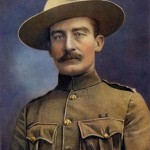 and I, since I was lying on my back, could answer succinctly and with illumination.” (Letter to Charlotte Shaw 31-8-1924, in: Malcolm Brown – The Letters Of T.E. Lawrence, p.273). When Baden Powell served as an officer in the army he always made friends with young men, which was rather an exception because of the snobbery involved. He would talk to them about their homes, their morals, their feelings, and their prospects, and sometimes he would give them money, but mostly advice. (Tim Jeal – Baden-Powell – Hutchinson, London 1989,p.99-100)
and I, since I was lying on my back, could answer succinctly and with illumination.” (Letter to Charlotte Shaw 31-8-1924, in: Malcolm Brown – The Letters Of T.E. Lawrence, p.273). When Baden Powell served as an officer in the army he always made friends with young men, which was rather an exception because of the snobbery involved. He would talk to them about their homes, their morals, their feelings, and their prospects, and sometimes he would give them money, but mostly advice. (Tim Jeal – Baden-Powell – Hutchinson, London 1989,p.99-100)
*17 Eric Kennington, in: T.E. Lawrence By His Friends,p.276-277
*18 More about TE’s childhood in the next article on this blog.
*19 Notes on a conversation between Jim Ede and Arnold Lawrence 1937, Kettle’s Yard (Cambridge).
*20 “The demon of the absolute” as André Malraux (1901-1976) called it. “One of the sorest things in life is to come to realise that one is just not good enough. Better perhaps than some, than many, almost – but I do not care for relatives, for matching myself against my kind. There is an ideal standard somewhere and only that matters; and I cannot find it. Hence this aimlessness.” (Letter to Eric Kennington 6-8-1934, in: David Garnett (ed.) – The Letters Of T.E. Lawrence – Jonathan Cape, London 1938,p.813-4)
*21 “My detached self always eyeing the performance through the wings in criticism.” (T.E. Lawrence – Seven Pillars of Wisdom – 1935,p.562) “I have a censorious devil within me …” (Letter to Robin Buxton 11-5-1923, in: Harold Orlans – T.E. Lawrence: Biography Of A Broken Hero – McFarland, Jefferson 2002,p.192)
*22 E.M. Forster – Clouds Hill, in: Two Cheers For Democracy (Edward Arnold, London 1951),p.352. The story is from Herodotus’ The Persian Wars (book 6, chapter 129). The dancer is Hippocleides. The Princess, who lost a husband, Agarista. And the king Cleisthenes.
*23 “I don’t like women in my place, anyhow; but am too perfect the little gent to refuse them.” (Letter to Jock Chambers 26-1-1935, in: David Garnett – The Letters Of T.E. Lawrence,p.841)
*24 “Two or three other men – sometimes more – of widely different types were among the regular visitors to Clouds Hill in those days. TE was an expert at “mixed grills” where men were concerned. He presided over the company, settling arguments, patiently answering all manner of questions, feeding the gramophone, making tea, stoking the fire, and by some magic of his own, managing to keep everyone in good humour.” (Alec Dixon, in: T.E. Lawrence By His Friends,p.375)
*25 Letter to Charlotte Shaw 30-4-1924, in: Jeremy & Nicole Wilson (eds.) – T.E. Lawrence Correspondence With Bernard And Charlotte Shaw 1922-1926,p.73-74. TE had met both “Posh” Palmer (1902-1983) and Arthur Russell (1904-1991) in the Tank Corps. They were “joyous to look at together: but they break all the furniture where they go”, as TE says in the same letter.
Boyishness, Childhood, Clouds Hill, Different sides, Ideal standard, Playfulness, Sarah Lawrence

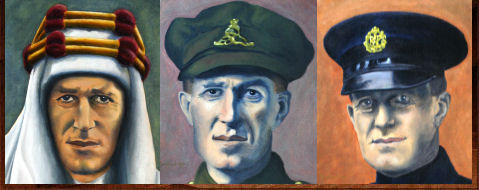
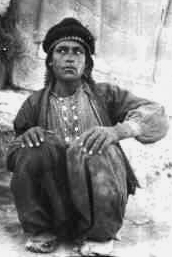

In quoting Arnold Lawrence and Jim Ede’s conversations, are you implying that Sarah Lawrence’s mistreatment of T.E. was more traumatic to him than being tortured and raped?
Thanks for you question Denis, it is greatly appreciated!
I would be rather more careful in phrasing that. I think what Arnold meant was that the effects of a childhood like his brother’s made TE more vulnerable and susceptible to trauma during the war, which probably doubled the effects and influence it had on him after the war, compared to a war veteran with a relatively happy childhood.
Would you agree with that?
Thank you so much for your insightful article. I was quite a “fan” of T.E. in my teens, untill “put off” by some of his comments about race in the “Pillars”, however your article is written with so much balance and objectivity I felt some of the old “Look and Learn” magic again. Well done.
This is a fascinating site which I got to by accident as I was looking up AW Lawrence after a TV archaeology programme on Flinders Petrie. I have always been fascinated by Lawrence since I read about him as an adolescent – partly because he seems like an eternal adolescent – you know that when we are in our teens and early twenties some of us consider we are sort of misunderstood geniuses? (Although TE WAS a genius of sorts – that’s the difference!) It seems from the evidence that you are quite right that TE’s sexual orientation is a red herring, as other aspects of his life were more important, and your theory of a type of post traumatic stress syndrome seems very convincing.
Re the ‘boyish’ aspect of TEL – have you come across the work of Jungian analysts regarding archetypes – inbuilt patterns of behaviour which Jung thought were almost like Greek or Hindu deities in that they are bigger than we are? (There’s lots more and I have written something about it as an academic – though hasten to add I’m not a Jungian trained expert.) There is a brilliant book called ‘Iron John’ by Robert Bly, who is also keen on Jung – it’s subtitled ‘A book about men’ but its insights are equally applicable to men and women. Bly describes an archetype called by Jungians the ‘Puer Aeternus’ – the Flying Boy. Peter Pan is an excellent example. He thinks that when young men believe they have been shamed in some way they can embrace this archetypal pattern and ‘fly away’ from the problem of confronting what is wrong in their lives, especially where there is an element of shame in the family. Bly’s examples of ‘shame’ include both alcohol/drug abuse and sexual irregularity, both of which seem to have been present in the ‘Lawrence’ family. Bly thinks that the flying boy archetype doesn’t really work, as the man is forever escaping his ‘baggage’ of hidden and ignored psychic problems, and the only way out is to ‘eat one’s shadow’ i.e. to confront all these inner demons. Maybe if TE had not died he might have done this – but interesting that his death was caused by ‘flight’ – speeding on his motorbike!
Interesting, enlightening and appreciated. Thank you.
I enjoyed your article and found it very insightful about Lawrence. I have been a member of the Lawrence Society since the start and fell under his ‘spell’ in 1961 (before the Lawrence of Arabia film). There are so many layers of interest in Lawrence and the older I get (am now 66), I can see the struggles he must have had in later life to combat inner tensions, and I believe he was very depressed by the time of his death.
From what I have read about Lawrence, and from my own experience with a psychologist, Lawrence’s maturation process was probably arrested by the treatment he received from his mother. An adolescent, if he matures ‘thoroughly,’ grows emotionally throughout his first sixteen years (Arnold Gesell – The Years From Ten To Sixteen). For one reason or another, the great majority of us experience some ‘damage’ during that crucial period that sets the stage for how we deal with life as adults. An outstanding example in Lawrence’s case of such ‘damage’ would seem to have occurred when his mother had him circumcised as age nine, just when a young person is trying to develop his feelings about himself. If an experience like that is traumatic enough, it can arrest emotional growth that could only be retrieved, perhaps, by therapy/counselling, which was in its infancy at that time of Lawrence’s life. We see examples of men who ‘never grew up’ all the time, for example, the guy whose wife is more mature than he is so that he seeks companionship with less mature women, thus ruining his marriage — the kind of guy you might see wearing a lampshade at a party. We’ve seen this sort of thing in the American presidency, where a man of brilliant intelligence and ability has not been able to grow up in another part of his life.
Greetings. Thank you for the interesting content.
I am the daughter of Thomas Edward Kerkhoven. I heard my grandfather, Joan Julian Kerkhoven (born Dutch East Indies 1909) was a friend of TE Lawrence. My grandfather died in the war (Fukuoka, Fukuoka Prefecture, Japan, 1943), so I could not get the history first hand. Have you come across anything in the records of TE Lawrence that might give evidence of that friendship? My father was just boy when his father died, but was told that his father and T.E. Lawrence used to share a love of fast cars, motorbikes, and (perhaps?) big game hunting. Kindly let me know if you come across anything.